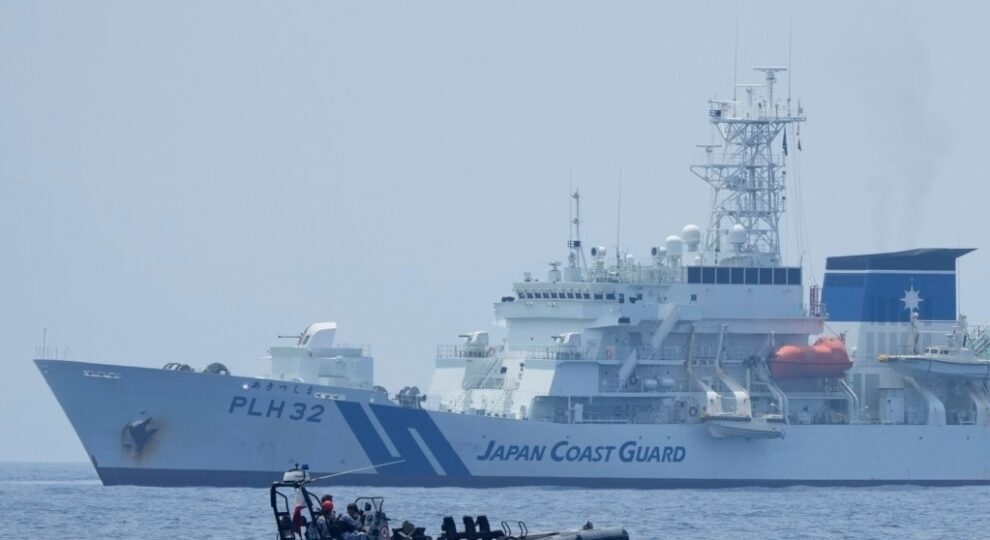TOKYO —
Just days ago, Chinese and Japanese coast guard ships faced off — again — over rocky islets in the East China Sea that each nation claims as its own.
Called the Senkaku in Japan and the Diaoyu in China, the Nov. 1 incident was a repeat of a similar incident on Oct. 17.
To ensure that this dispute and others like it do not escalate due to a lack of communications, Toyko and Beijing took a step backward on May 16,
when Japan’s then-Defense Minister Yasukazu Hamada placed a phone call to his then-Chinese counterpart, Li Shangfu.
Despite a sometimes fraught bilateral relationship, the call was not made to warn or convey misgivings. Rather, it was simply to test that a new channel of communications had opened between the two countries’ defense establishments: an old-fashioned hotline.
“Ordinarily, hotlines are meant to enhance communication and clarity during crisis periods,” Stephen R. Nagy, a political scientist at Tokyo’s International Christian University, explained to VOA by email. “If they are actually used with that purpose, we might see them as an important tool in stabilizing the relationship.”
The notion of a hotline perhaps first captured the public imagination in 1963 in the wake of the Cuban Missile Crisis, but the idea dates to a link established between President Franklin D. Roosevelt and British Prime Minister Winston Churchill during World War II.
Present-day hotlines like that between Japan and China exist among both allies and parties to potentially contentious situations. President Joe Biden announced that one would be established for Japan, South Korea and the U.S. when the three nations met at Camp David in August.
And on Oct. 17, South Korea’s Yonhap News Agency reported that the United States, Japan and South Korea had established a new three-way hotline to coordinate responses to shared regional concerns in the western Pacific.
For Japan and China, hopes are that the bilateral hotline activated at the end of March will help strengthen relations that can sometimes be delicate.
“Mechanisms such as [this] hotline that help to build trust between Japan and China are extremely important. In that sense, the inauguration of this hotline is deeply significant,” said Atsurō Wada, an official in the China and Mongolia Section at Japan’s Ministry of Foreign Affairs.
China’s embassy in Tokyo declined to comment. However, in an official statement issued in March on the hotline’s establishment, the PRC’s Ministry of National Defense said, “The establishment of the direct telephone link will effectively enrich the China-Japan defense communication channels, strengthen the capabilities of both sides to manage and control maritime and air crises, and help maintain regional peace and stability.”
Bilateral tensions remain at a simmer, with close encounters between Chinese and Japanese naval and coast guard vessels in the waters off southwestern Japan a not-infrequent occurrence.
“Japan has been concerned about escalation in the East China Sea, South China Sea, and Taiwan Straits since as early as the 1990s in which nationalist parties on both sides jousted over nationalists’ claims over the Senkaku Islands,” said Nagy. “With China’s substantially increased military capabilities and use of merchant vessels to assert their claims, the chances of conflict — accidental or intentional — have increased.”
Furthermore, Beijing regularly invokes memories of Japanese atrocities during the second Sino-Japanese conflict that in its latter years overlapped with World War II in the Pacific. With 20 million military and civilians Chinese killed, and 480,000 Japanese soldiers dying on Chinese soil, the eight-year conflict was one of the bloodiest in world history.
“As a country responsible for the historical crimes it committed against China, Japan needs to all the more draw lessons from history and act prudently,” read one statement issued in August on the occasion of a prominent Japanese politician’s visit to Taiwan.
Given this backdrop, the degree to which a hotline between Japanese and Chinese defense authorities can help is as yet an open question.
Michael MacArthur Bosack, an international negotiator who is the special adviser for government relations at the Yokosuka Council on Asia-Pacific Studies, wrote in a commentary published Sept. 7 by the U.S. Institute of Peace, that “it would only take one side refusing to pick up the phone to undo the years it took to activate the line in the first place.”
A hotline “can help to diffuse certain situations. If one ship crashes into another or some plane goes missing, [the parties concerned] can say, ‘This is what’s happening, and it was an accident,’” said Robert Dujarric, co-director of the Institute of Contemporary Asian Studies at Temple University Japan. “But it all depends on someone picking up the phone, and whether that person has some authority or power to do something.”
Recent turnover in both countries’ defense authorities casts the need for stability in stark relief. China’s Li Shangfu was dismissed as defense minister in late October. No explanation was given for his removal, and Beijing has yet to name a replacement for him.
In September, Japanese Prime Minister Fumio Kishida appointed Minoru Kihara, a politician with a track record of promoting stronger ties between Tokyo and Taipei, as Japan’s new defense minister.
“The trajectory of China’s regional behavior and pro-Russian neutral position has alarmed Japan and its thinking about Sino-Japanese relations,” Nagy wrote in his email to VOA. “There is a deepening pessimism on the direction of the relationship requiring more frank and nuanced views about the future of the relationship accounting for more realists in the Cabinet.”
At the same time, Nagy said, “Considering sea lines of communication in the region ferry most of Japan’s imports and exports and energy resources, [the Japanese] were determined to inculcate any stability that is possible through things like this hotline. The question is whether it will work?”
Source : VOA News










